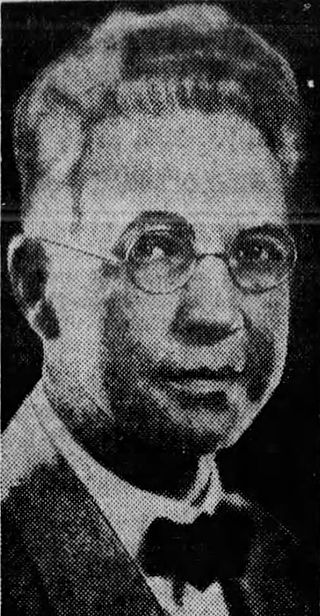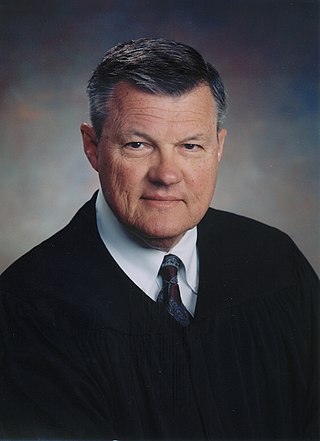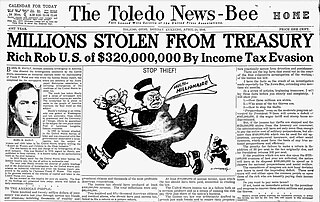Related Research Articles

Wesley Trent Snipes is an American actor. He appeared in the films Major League (1989), New Jack City (1991), Jungle Fever (1991), White Men Can't Jump (1992), Passenger 57 (1992), Rising Sun (1993), Demolition Man (1993), To Wong Foo, Thanks for Everything! Julie Newmar (1995), U.S. Marshals (1998), The Expendables 3 (2014), Coming 2 America (2021), and the Blade film trilogy (1998–2004), portraying Blade. In television, he appeared on The Player (2015). Snipes was nominated for the Independent Spirit Award for Best Supporting Male for his work in The Waterdance (1992) and won the Volpi Cup for Best Actor for his performance in the film One Night Stand (1997).

Halsted Lockwood Ritter was a United States district judge of the United States District Court for the Southern District of Florida. He was the thirteenth individual to be impeached by the United States House of Representatives and the fourth individual to be convicted and removed from office in an impeachment trial before the United States Senate. He was also the last federal official to be impeached by the House of Representatives until Harry E. Claiborne, when he was impeached and removed from office by the Senate for tax evasion in 1986.

Irwin Allen Schiff was an American libertarian and tax resistance advocate known for writing and promoting literature in which he argued that the income tax in the United States is illegal and unconstitutional. Judges in several civil and criminal cases ruled in favor of the federal government and against Schiff. As a result of these judicial rulings Schiff was in a hospital prison serving a sentence of 162 months at the time of his death.
Cheek v. United States, 498 U.S. 192 (1991), was a United States Supreme Court case in which the Court reversed the conviction of John L. Cheek, a tax protester, for willful failure to file tax returns and tax evasion. The Court held that an actual good-faith belief that one is not violating the tax law, based on a misunderstanding caused by the complexity of the tax law, negates willfulness, even if that belief is irrational or unreasonable. The Court also ruled that an actual belief that the tax law is invalid or unconstitutional is not a good faith belief based on a misunderstanding caused by the complexity of the tax law, and is not a defense.
A tax protester, in the United States, is a person who denies that he or she owes a tax based on the belief that the Constitution of the United States, statutes, or regulations do not empower the government to impose, assess or collect the tax. The tax protester may have no dispute with how the government spends its revenue. This differentiates a tax protester from a tax resister, who seeks to avoid paying a tax because the tax is being used for purposes with which the resister takes issue.
The Law That Never Was: The Fraud of the 16th Amendment and Personal Income Tax is a 1985 book by William J. Benson and Martin J. "Red" Beckman which claims that the Sixteenth Amendment to the United States Constitution, commonly known as the income tax amendment, was never properly ratified. In 2007, and again in 2009, Benson's contentions were ruled to be fraudulent.
Tax protesters in the United States have advanced a number of arguments asserting that the assessment and collection of the federal income tax violates statutes enacted by the United States Congress and signed into law by the President. Such arguments generally claim that certain statutes fail to create a duty to pay taxes, that such statutes do not impose the income tax on wages or other types of income claimed by the tax protesters, or that provisions within a given statute exempt the tax protesters from a duty to pay.
Tax protesters in the United States advance a number of conspiracy arguments asserting that Congress, the courts and various agencies within the federal government—primarily the Internal Revenue Service (IRS)—are involved in a deception deliberately designed to procure from individuals or entities their wealth or profits in contravention of law. Conspiracy arguments are distinct from, though related to, constitutional, statutory, and administrative arguments. Proponents of such arguments contend that all three branches of the United States government are working covertly to defraud the taxpayers of the United States through the illegal imposition, assessment and collection of a federal income tax.
Eddie Ray Kahn is an American tax protester. Kahn is currently in prison for tax crimes, with a tentative release date of 2026. Kahn founded the group American Rights Litigators and ran the for-profit businesses "Guiding Light of God Ministries" and "Eddie Kahn and Associates." According to the U.S. Justice Department, all three organizations are or were illegal tax evasion operations.
Edward Lewis Brown and his wife, Elaine Alice Brown, residents of the state of New Hampshire, gained national news media attention as tax protesters in early 2007 for refusing to pay the U.S. federal income tax and subsequently refusing to surrender to federal government agents after having been convicted of tax crimes. After the conviction and sentencing, a long, armed standoff with federal law enforcement authorities at their New Hampshire residence ended with the arrest of Edward and Elaine Brown on October 4, 2007. In July 2009, while serving their sentences for the tax crimes, the Browns were found guilty by a federal district court jury of additional criminal charges arising from their conduct during the standoff.

Thomas Milton Street Sr. was an American businessman, a Pennsylvania state senator from Philadelphia, and the brother of former Philadelphia mayor John F. Street. Originally a street hot dog vendor, he rose to prominence as an activist challenging the city's vending and housing ordinances.
Tommy Keith Cryer, also known as Tom Cryer, was an attorney in Shreveport, Louisiana who was charged with and later acquitted of willful failure to file U.S. Federal income tax returns in a timely fashion. In a case in United States Tax Court, Cryer contested a determination by the U.S. Internal Revenue Service that he owed $1.7 million in taxes and penalties. Before the case could come to trial, Cryer died June 4, 2012. He was 62.

William Terrell Hodges was a United States district judge of the United States District Court for the Middle District of Florida.
The 861 argument is a statutory argument used by tax protesters in the United States, which interprets a portion of the Internal Revenue Code as invalidating certain applications of income tax. The argument has uniformly been held by courts to be incorrect, and persons who have cited the argument as a basis for refusing to pay income taxes have been penalized, and in some cases jailed.
A tax protester is someone who refuses to pay a tax claiming that the tax laws are unconstitutional or otherwise invalid. Tax protesters are different from tax resisters, who refuse to pay taxes as a protest against a government or its policies, or a moral opposition to taxation in general, not out of a belief that the tax law itself is invalid. The United States has a large and organized culture of people who espouse such theories. Tax protesters also exist in other countries.
Tax protester arguments are arguments made by people, primarily in the United States, who contend that tax laws are unconstitutional or otherwise invalid.
Barrie Leslie Konicov was a United States hypnotist, author, and one-time Libertarian candidate for the United States Congress. He was the President and chief hypnotherapist of Potentials Unlimited. At one time Konicov sold approximately a million self-hypnosis tapes a year. Konicov was also notable for his involvement in several court cases including United States v Konicov, a 2001 conviction for one count of conspiracy to defraud the United States by impeding, impairing, obstructing, and defeating the lawful governmental functions of the Internal Revenue Service. He was also convicted on three counts of willfully failing to file Federal income tax returns for the years 1994, 1995, and 1996. Konicov received an 87-month prison sentence. The Atlantic magazine named Konicov fourth on its list of the ten biggest tax scofflaws of the 20th century.

Under the federal law of the United States of America, tax evasion or tax fraud, is the purposeful illegal attempt of a taxpayer to evade assessment or payment of a tax imposed by Federal law. Conviction of tax evasion may result in fines and imprisonment. Compared to other countries, Americans are more likely to pay their taxes on time and law-abidingly.
Robert Edward Barnes is a lawyer and founder of Barnes Law LLP, a Los Angeles-based law firm.
References
- ↑ Associated Press Wesley Snipes in Custody on Tax Charges 12/8/06
- ↑ Associated Press, "Tax Protester Linked to Snipes Convicted", Dec. 9, 2006, The Washington Post , at .
- ↑ "Pennsylvania Elections – Summary Results". electionreturns.pa.gov. Archived from the original on May 22, 2008.
- ↑ "Allentown Morning Call".
- ↑ "Tax Protester Linked to Snipes Convicted". The Washington Post . Archived from the original on 2018-09-11.
- ↑ "Wesley Snipes acquitted of federal tax fraud," Today.com, Feb. 1, 2008, at .
- ↑ Snipes acquitted of tax-fraud, conspiracy, Associated Press, as reported by CNN, February 1, 2006.
- ↑ Docket entry 134, Dec. 11, 2006, United States v. Farnsworth, case no. 2:04-cr-00707-JP-1, United States District Court for the Eastern District of Pennsylvania, Philadelphia Division.
- ↑ See "Tax protester gets more than 2 years - Yahoo! News". Archived from the original on 2007-04-06. Retrieved 2007-04-04..
- ↑ United States v. Farnsworth, case no. 07-2200, 2009-1 U.S. Tax Cas. (CCH) paragr. 50,104 (3d Cir. 2008).
- ↑ Patrick Lester, "Tax evader from Bucks freed after 2 years in prison," April 16, 2009, The Morning Call, at .
- ↑ Christopher Ruvo, "'Tax honesty' advocate runs afoul of IRS," March 26, 2010, Bucks County Courier Times (Bucks County, Pennsylvania), at [ permanent dead link ].
- ↑ Christopher Ruvo, "Tax rebel ordered to return to prison," The Intelligencer, May 5, 2010, at [ permanent dead link ].
- ↑ Prisoner number 58722-066, Federal Bureau of Prisons, U.S. Dep't of Justice, at .